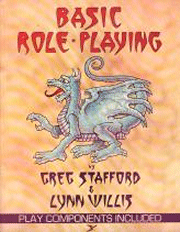
Basic Role-Playing (BRP) is a tabletop role-playing game which originated in the RuneQuest fantasy role-playing game. Chaosium released the BRP standalone booklet in 1980 in the boxed set release of the second edition of RuneQuest. Greg Stafford and Lynn Willis are credited as the authors. Chaosium used the percentile skill-based system as the basis for most of their games, including Call of Cthulhu, Stormbringer, and Elfquest.

Earthdawn is a fantasy role-playing game, originally produced by FASA in 1993. In 1999 it was licensed to Living Room Games, which produced the Second Edition. It was licensed to RedBrick in 2003, who released the Classic Edition in 2005 and the game's Third Edition in 2009. The license is now held by FASA Games, Inc., who have released the Fourth Edition, with updated mechanics and an advanced metaplot timeline. Vagrant Workshop released the Age of Legend edition in 2016 using alternative rules-lite mechanics.

Fudge is a generic role-playing game system for use in freeform role-playing games. The name "FUDGE" was once an acronym for Freeform Universal DonatedGaming Engine and, though the acronym has since been dropped, that phrase remains a good summation of the game's design goals. Fudge has been nominated for an Origins Award for Best Role-Playing Game System for the Deryni Adventure Game.

The Ringworld science fiction role-playing game was published by Chaosium in 1984, using the Basic Role-Playing system for its rules and Larry Niven's Ringworld novels as a setting.
Traveller is a science fiction role-playing game first published in 1977 by Game Designers' Workshop. Marc Miller designed Traveller with help from Frank Chadwick, John Harshman, and Loren Wiseman. Editions were published for GURPS, d20, and other role-playing game systems. From its origin and in the currently published systems, the game relied upon six-sided dice for random elements. Traveller has been featured in a few novels and at least two video games.
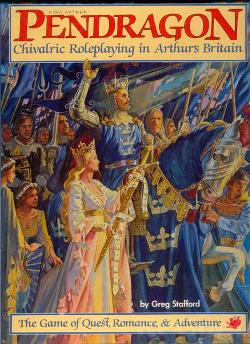
Pendragon, or King Arthur Pendragon, is a Tabletop role-playing game (RPG) in which players take the role of knights performing chivalric deeds in the tradition of Arthurian legend. It was originally written by Greg Stafford and published by Chaosium, then was acquired by Green Knight Publishing, who in turn passed on the rights to White Wolf Publishing in 2004. White Wolf sold the game to Stewart Wieck in 2009. Wieck formed Nocturnal Media, who updated and reissued the 5th edition originally published by White Wolf. In 2018, it returned to Chaosium.
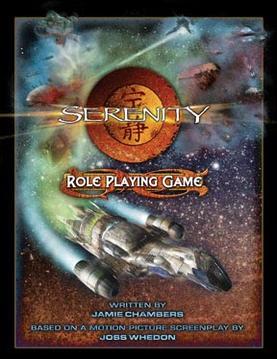
Serenity Role Playing Game is a science fiction tabletop role-playing game released in 2005 and set in the universe of the movie Serenity and the television series Firefly. It was produced by Margaret Weis Productions, Ltd, and its mechanics were the first iteration of the Cortex System. It won an Origins Award for Best RPG in 2005. Margaret Weis's license came to an end on January 31, 2011.

Star Hero is a science fiction role-playing game published by Hero Games and Iron Crown Enterprises (ICE) in 1989. The game uses the Hero System rules also used in other Hero Games publications such as Champions and Danger International.
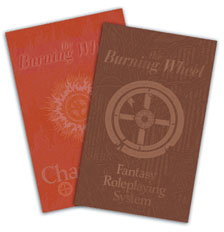
The Burning Wheel is a fantasy tabletop role-playing game independently written and published by Luke Crane. The game uses a dice pool mechanic for task resolution and a character generation system that tracks the history and experiences of new characters from birth to the point they begin adventuring.

Space Master is a science fiction role-playing game produced by Iron Crown Enterprises (ICE) in 1985.

Mass Effect is an action role-playing game developed by BioWare and published by Microsoft Game Studios, originally released for the Xbox 360 in November 2007. It is the first game in the Mass Effect series, and takes place within the Milky Way galaxy in the year 2183, where civilization is threatened by a highly advanced machine race known as the Reapers. The player assumes the role of Commander Shepard, an elite human soldier who must stop a rogue agent from carrying out the Reapers' galactic invasion. The game involves completing multiple quests that generally involve space exploration, squad and vehicular combat, and interaction with non-player characters.

The Legend of the Five Rings Roleplaying Game is a role-playing game originally written by John Wick and published by Alderac Entertainment Group, under license from Five Rings Publishing Group, in 1997. The game uses the Legend of the Five Rings setting, primarily the nation of Rokugan, which is based on feudal Japan with influences from other East Asian cultures.

An indie role-playing game is a role-playing game published by individuals or small press publishers, in contrast to games published by large corporations. Indie tabletop role-playing game designers participate in various game distribution networks, development communities, and gaming conventions, both in person and online. Indie game designer committees grant annual awards for excellence.
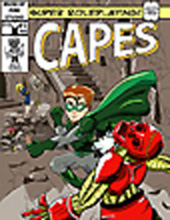
Capes is a role-playing game by Tony Lower-Basch, independently published by Muse of Fire Games.
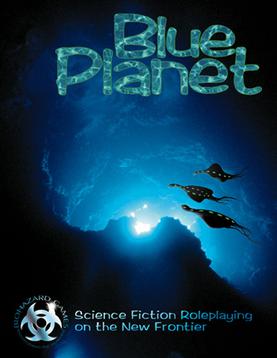
Blue Planet is an environmentalist science fiction role-playing game first published by Biohazard Games in 1997, set on the planet Poseidon.

Sheva's War is a five-issue fully painted limited series graphic novel published in 1998. It was the final title to be released under the short-lived DC Comics imprint Helix.

Hollow Earth Expedition is a pulp fiction role-playing game set in the fictitious Hollow Earth, published by Exile Game Studio. The game has been nominated for several Origins and ENnie awards since its release in 2006. The main rule book is Hollow Earth Expedition.

A tabletop role-playing game (TTRPG), also known as a pen-and-paper role-playing game, is a kind of role-playing game (RPG) in which the participants describe their characters' actions through speech and sometimes movements. Participants determine the actions of their characters based on their characterization, and the actions succeed or fail according to a set formal system of rules and guidelines, usually involving randomization. Within the rules, players have the freedom to improvise, and their choices shape the direction and outcome of the game.
The Indie RPG Awards were annual, creator-based awards for Indie role-playing games and supplements. They were established in 2002 by Andy Kitkowski. The final round of awards was given in 2017.

Powered by the Apocalypse (PbtA) is a tabletop role-playing game design framework developed by Meguey Baker and Vincent Baker for the 2010 game Apocalypse World and later adapted for hundreds of other indie role-playing games.

















